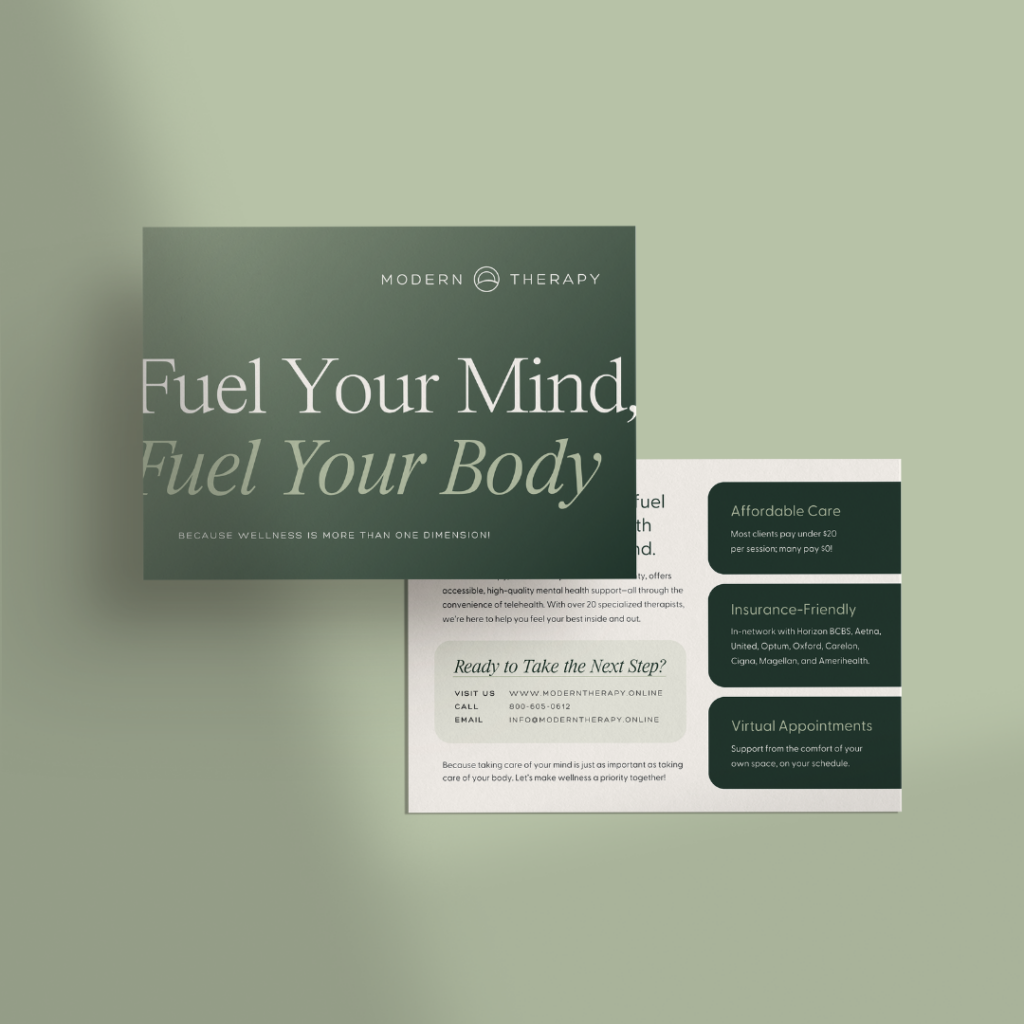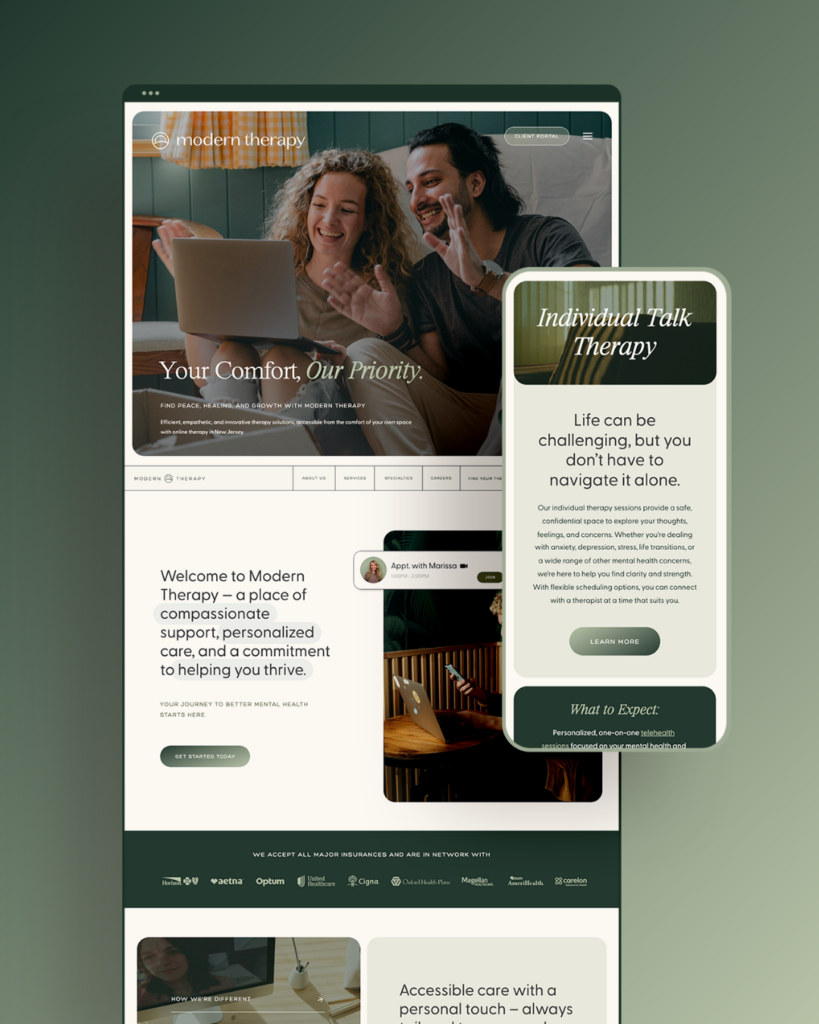At Liberty Type, we know that therapists face unique challenges when it comes to branding and marketing. For decades, mental health services were stigmatized, shrouded in misunderstandings, and often avoided due to fear or shame. However, the landscape is changing, and with it comes the opportunity for therapy centers to stand out with branding that is approachable, empathetic, and relatable.
Therapists are more than just service providers; they are changemakers, offering safe spaces for healing and growth. But how do you communicate this in a way that resonates with potential clients, breaks down stigmas, and builds trust from the first interaction? That’s where Liberty Type comes in.
With experience partnering with nearly a dozen therapy centers and private practices, we’ve developed a branding process tailored to meet the needs of mental health professionals. Here’s how we help therapists create branding that connects, converts, and ultimately serves their communities.

1. Deeply Understanding Your Target Audience
Successful branding starts with a comprehensive understanding of your audience. For therapists, this means digging deeper into the emotions, struggles, and aspirations of your ideal clients. What are they searching for when they decide to seek therapy? What barriers—emotional, cultural, or logistical—might be stopping them?
At Liberty Type, we go beyond demographic data. We conduct in-depth research to uncover psychographics, including:
- Pain points (e.g., anxiety, burnout, grief)
- Motivations for seeking help (e.g., personal growth, improved relationships)
- Barriers to entry (e.g., stigma, financial concerns, fear of vulnerability)
This information allows us to craft messaging that speaks directly to your clients, using language that feels accessible, supportive, and reassuring.
2. Creating Relatable and Compassionate Messaging
Therapists often struggle to strike the right balance between professionalism and approachability. While clinical expertise is critical, overly technical or jargon-filled messaging can alienate potential clients who are already feeling vulnerable.
Our approach focuses on crafting messaging that is:
- Authentic: Clients want to feel seen and heard. We use language that reflects empathy and aligns with your therapeutic approach.
- Compassionate: Warm, understanding tones help potential clients feel safe from the first point of contact.
- Relatable: By using language that resonates with everyday struggles, we create messaging that invites clients to feel comfortable taking the next step.
For example, rather than saying, “We provide cognitive behavioral therapy for anxiety disorders,” we might craft a message like, “Together, we’ll uncover strategies to manage your anxiety, giving you tools to live with greater peace and confidence.”
3. Building a Strong and Inviting Brand Identity
Your brand identity is the foundation of how clients perceive your practice. For therapists, this means creating a visual and emotional presence that reflects warmth, professionalism, and inclusivity.
At Liberty Type, we design brand identities that convey your practice’s unique philosophy, values, and approach to care. This includes:
- A Calming Color Palette: Soft, neutral tones often work well in therapy branding, but we customize palettes to reflect your practice’s personality—whether that’s modern, traditional, or holistic.
- Thoughtful Typography: Fonts are chosen to evoke trust and accessibility, steering clear of overly formal or clinical aesthetics.
- Imagery with Intention: Photos and illustrations focus on connection, hope, and growth. Whether it’s serene landscapes or diverse, smiling faces, the imagery resonates with your audience’s emotional needs.

4. Designing Websites That Convert
Your website is your digital storefront—it’s where most potential clients form their first impression of your practice. A poorly designed website can be a significant barrier to entry for people already hesitant about seeking therapy.
We specialize in creating websites for therapists that are:
- User-Friendly: Intuitive navigation makes it easy for clients to find the information they need, from services to FAQs to scheduling.
- SEO-Optimized: With effective keywords like “therapy for anxiety in [City]” or “couples counseling near me,” your site will rank higher on search engines, ensuring clients can find you.
- Welcoming and Informative: We use concise, clear copy to explain your services, highlight your expertise, and guide clients to take action—whether that’s booking a consultation or reading a blog post.
For example, our work with Apricity Counseling included designing a website that feels like a safe, inviting space for clients to explore therapy options. Every page communicates a sense of care and professionalism, from the homepage to the contact form.
5. Developing Consistent Social Media Strategies
Social media is a powerful tool for demystifying therapy and connecting with potential clients. However, many therapists struggle with what to post and how to maintain a consistent presence.
We help our clients create social media strategies that align with their brand while respecting ethical guidelines. This includes:
- Educational Content: Posts that provide value, such as tips for managing stress or understanding the benefits of therapy.
- Inspirational Stories: Share client success stories (with permission) or general anecdotes that highlight growth and resilience.
- Interactive Engagement: Use polls, Q&A sessions, or comments to encourage meaningful interactions with your audience.
For instance, we might develop a month’s worth of Instagram posts for a therapist focusing on anxiety management, including practical breathing exercises, relatable quotes, and reminders about the importance of self-care.
6. Highlighting Social Proof
Testimonials, case studies, and reviews are some of the most effective tools for building trust. We guide our clients in ethically showcasing social proof that demonstrates their expertise and success. This might include:
- Anonymous Testimonials: Sharing anonymized client feedback that highlights positive outcomes.
- Media Mentions: If you’ve been featured in podcasts, articles, or local news, we incorporate these accolades into your branding to enhance credibility.
- Success Metrics: For therapy centers, we might include data about the number of clients served or satisfaction survey results.
7. Offering Lead Magnets to Build Trust
Not everyone is ready to book a therapy session right away. That’s why we help therapists create valuable lead magnets—free resources like e-books, checklists, or mindfulness guides—that capture contact information and provide a way to nurture potential clients over time.
For example, a couples’ counselor might offer a free guide titled “10 Communication Tips for a Healthier Relationship,” providing value while showcasing their expertise.
Empowering Therapists to Make a Difference
At Liberty Type, we understand that your work as a therapist changes lives. Our mission is to amplify your impact by helping you reach the clients who need you most. Through strategic branding, compelling messaging, and powerful design, we ensure your practice stands out while maintaining the authenticity and empathy that make your work so transformative.
If you’re ready to create a brand that breaks through barriers and connects with your ideal clients, let’s work together. Schedule a consultation and discover how Liberty Type can elevate your practice today.
If you’re a seasoned professional—a dentist, interior designer, chiropractor, therapist, or any other expert who has spent years building a solid reputation—then you may have noticed a shift in your industry. Clients are making different decisions, new competitors are entering the scene, and the way people choose businesses doesn’t feel the way it used to. […]

Copyright 2025 Liberty Type | Terms | Privacy | Fulfillment | We wrote the site ourselves - no AI
